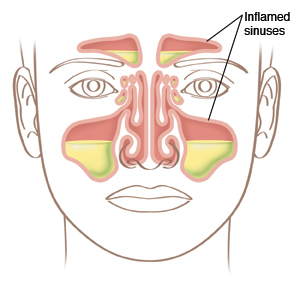Sinusitis (No Antibiotics)

The sinuses are air-filled spaces in the bones of the face. They connect to the inside of the nose. Sinusitis is redness and swelling (inflammation) of the tissue that lines the sinuses. It can occur during a cold. It can also be due to allergies to pollens and other particles in the air. It can cause symptoms, such as sinus congestion, headache, sore throat, face swelling, and a feeling of fullness. It may also cause a low-grade fever. This type of sinusitis is not caused by an infection with bacteria. So antibiotics aren't used to treat it.
Home care
-
Drink plenty of water, hot tea, and other liquids, as directed by the healthcare provider. This may help thin nasal mucus. It also may help your sinuses drain fluids.
-
Heat may help soothe painful parts of your face. Use a towel soaked in hot water. Or stand in the shower and direct the warm spray on your face. Using a vaporizer along with a menthol rub at night may also help soothe symptoms.
-
An expectorant with guaifenesin may help thin nasal mucus and help your sinuses drain fluids. If you have any questions about an over-the-counter medicine or its side effects, talk with your healthcare provider or pharmacist before taking it.
-
You can use an over-the-counter decongestant, unless a similar medicine was prescribed to you. Nasal sprays work the fastest. Use one that has phenylephrine or oxymetazoline. But only use it for a total of 3 days. First blow your nose gently. Then use the spray. Don't use these medicines more often than directed on the label. If you do, your symptoms may get worse. You may also take pills that contain pseudoephedrine for up to 7 days. Don’t use products that combine multiple medicines. This may increase side effects. Read all medicine labels. You can also ask the pharmacist for help. (People with high blood pressure should not use decongestants. They can raise blood pressure.)
-
Over-the-counter antihistamines or steroid nasal sprays, if advised by the healthcare provider, may help if allergies were the cause of your sinusitis.
-
Use acetaminophen or ibuprofen to control pain, unless another pain medicine was prescribed to you. If you have long-term (chronic) liver or kidney disease, or ever had a stomach ulcer, talk with your provider before using these medicines. Aspirin should never be taken by anyone under age 19 unless directed by the provider. It can lead to a risk for Reye syndrome. This is a rare but very serious disorder that most often affects the brain and the liver.
-
Use nasal rinses or irrigation with saltwater as directed by your provider.
-
Don't smoke. This can make symptoms worse.
Follow-up care
Follow up with your healthcare provider if you are not better in 1 week.
When to get medical care
Call your healthcare provider if any of these occur:
-
Green or yellow fluid draining from your nose or into your throat
-
Facial pain or headache that gets worse
-
Stiff neck
-
Swelling of your forehead or eyelids
-
Vision problems, such as blurred or double vision
-
Fever of 100.4ºF (38ºC) or higher, or as advised by your provider
-
Symptoms that don't go away in 10 days or get worse after starting to get better
Call 911
Call 911 if any of the following occur:
-
Seizure
-
Trouble breathing
-
Abnormal drowsiness or confusion
-
Feeling dizzy or faint
-
Fingernails, skin, or lips look blue, purple, or gray
Online Medical Reviewer:
Jessica Gotwals RN BSN MPH
Online Medical Reviewer:
Rita Sather RN
Online Medical Reviewer:
Sumana Jothi MD
Date Last Reviewed:
12/1/2022
© 2000-2025 The StayWell Company, LLC. All rights reserved. This information is not intended as a substitute for professional medical care. Always follow your healthcare professional's instructions.